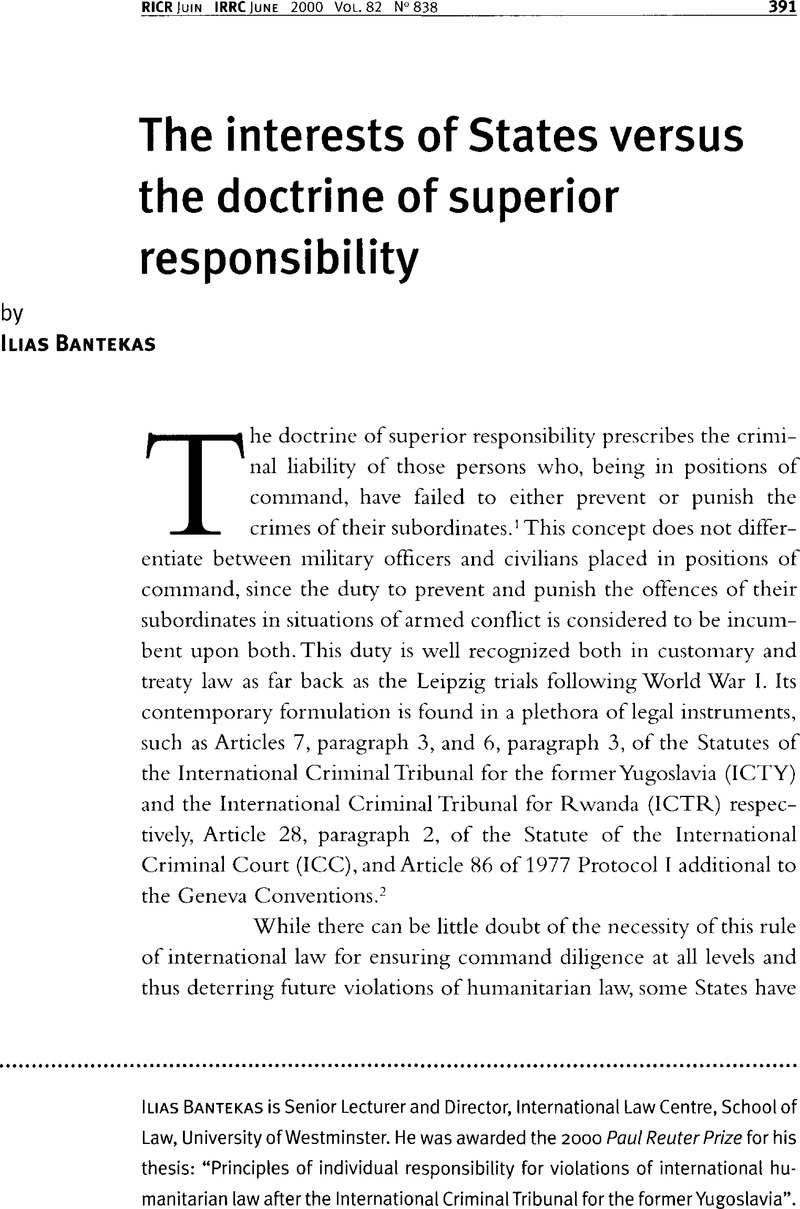No CrossRef data available.
Published online by Cambridge University Press: 27 April 2010

1 See generally Parks, William H., “Command responsibility for war crimes”, Military Law Review, vol. 62, 1973, p. 1Google Scholar.
2 See I. Bantekas/S. Nash/M. Mackarel, International Criminal Law, to appear shortly (Cavendish Publishing).
3 The same argument has been identified as regards the issue of superior orders, through the balancing of military obedience with the requirement that crimes should not go unpunished. See Garraway, C., “Superior orders and the International Criminal Court: Justice delivered or justice denied?”, IRRC, No. 836, December 1999, pp. 785–794Google Scholar.
4 United States v. Medina, 43 CM.R., 1971, p. 243.
5 Final Report of the Kahan Commission (authorized English translation), 22 ILM, 1983, p. 473.
6 S.C. Res. 808 (1993).
7 Advisory Opinion Concerning Reservations to the Genocide Convention, I.C.J. Reports 1951, p. 15.
8 Belgium v. Spain, Barcelona Traction Light and Power House Co. Ltd. (Second Phase), I.C.J. Reports, 1970, p. 3.
9 ILR, vol. 101, 1997, p. 64. See also Redgwell, C., “Reservations to treaties and Human Rights Committee General Comment No. 24”, ICLQ, vol. 46, 1997, p. 390CrossRefGoogle Scholar.
10 This is particularly evident as regards the Statute of the ICC (Art. 120) and the 1998 Ottawa Convention on Anti-Personnel Mines.
11 See Rosenstock, R., “The fiftieth session of the International Law Commission”, AJIL, vol. 93, 1999, p. 237CrossRefGoogle Scholar.
12 Arts. 72 of the ICC Statutes, relating to protection of national security interests, and 73, relating to disclosure of documents in the hands of third parties, are good examples of protective mechanisms.
13 See Prosecutor v. Blaskic, Appeals Judgment on the Request of the Republic of Croatia for Review of the Decision of Trial Chamber II, 18 July 1997, ILR, vol. 110, 1998, p. 607Google Scholar.
14 This was suggested by the Special Rapporteur of the Commission on Human Rights on extrajudicial, summary or arbitrary executions in his Report to ECOSOC, UN Doc. A/51/4577 October 1996.
15 United States v. von Leeb (High Command case). Trials of War Criminals before the Nuremberg Military Tribunals under Control Council Law No. 10, vol. 11 (Trials), 1950, p. 1462Google Scholar.
16 Government Commissioner of the General Tribunal of the Military Government for the French Zone of Occupation in Germany v. Roechling (Roechling case), vol. 14 (Trials), 1950, p. 1097Google Scholar.
17 United States v. von Weizsaecker (Ministries case), ibid, p. 308.
18 ICTY Prosecutor v. Milosevic and Others, Indictment of 22 May 1999, at www.un.org/icty/indictment/english/24-05-99milo/htm
19 ICTR, Prosecutor v. Kambanda, 37 ILM, 1998, p. 1411.
20 Regina v. Bartle and the Commissioner of Police for the Metropolis and Others; Regina v. Evans and Another and the Commissioner of Police for the Metropolis and Others (ex parte Pinochet Ugarte Respondent), 2 All ER 97 (1999). It is doubtful, however, that a municipal court will ever deny immunity to an acting head of State.
21 ICTY, Prosecutor v. Karadzic and Mladic, ILR, vol. 108, 1998, p. 86Google Scholar.
22 See D'Amato, A., “Superior orders vs. command responsibility”, AJIL, vol. 88, 1994, p. 500CrossRefGoogle Scholar.
23 Record of Proceedings of the International Military Tribunal for the Far East (1946–1949), vol.20, pp. 49Google Scholar, 791 and 49, 831, reprinted in J.R. Pritchard (ed.), The Tokyo War Crimes Trial, Garland, New York, 1981–1988.
24 In ICTY, Prosecutor v. Delalic and Others (Celebici case), 38 ILM, 1998, p. 57, the Trial Chamber categorically stated that such a presumption does not exist under customary international law. The present author is in disagreement with the opinion of the ICTY, as there are numerous examples that confirm a contrary view. See Bantekas, I., “The contemsumption porary law of superior responsibility”, AJIL, vol. 93, 1999, pp. 588–589CrossRefGoogle Scholar.
25 Ibid., pp. 584–587.
26 Loc. cit. (note 24), para. 645.
27 See Report of the Secretary-General pursuant to Paragraph 2 of Security Council Resolution 808 (1993), UN Doc. S/25704, para. 56; Bantekas, op. cit. (note 24).
28 Loc. cit. (note 15), p. 533.
29 ICTY, Prosecutor v. Tadic, Interlocutory Appeals Decision on Jurisdiction, ILR, vol. 105, 1997. p. 453Google Scholar.
30 See Bantekas, op. cit. (note 24), p. 593.
31 Former Syrian Ambassador to the German Democratic Republic case, ILR, vol. 115, 1996, p. 601Google Scholar.